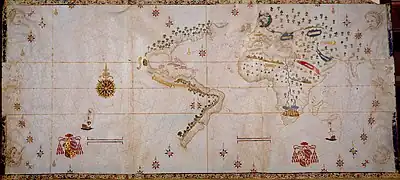
The Salviati Planisphere
The Salviati Planisphere is a world map showing the Spanish view of the Earth's surface at the time of the map's creation, c. 1525, and includes the eastern coasts of North and South America and the Straits of Magellan. Rather than include imagined material in unexplored areas—as was customary—it is content to leave them blank, inviting future exploration.
It is believed to have been drawn by Nuño García de Toreno, the head of the Casa de la Contratación, in Seville. It takes its name from Cardinal Giovanni Salviati, the papal nuncio to Spain from 1525–30, who was given it by Holy Roman Emperor Charles V, also King of Spain at the time.[1][2][3]
It is currently located at the Biblioteca Medicea Laurenziana, in Florence, Italy.[4][5]
See also
References
- ↑ Reinhartz, Dennis, ed. (1998). The Mapping of the Entradas Into the Greater Southwest. University of Oklahoma Press. p. 62. ISBN 0806130474.
- ↑ Ricardo Padrón (2004). The Spacious Word: Cartography, Literature, and Empire in Early Modern Spain. University of Chicago Press. p. 131. ISBN 978-0-226-64433-2.
- ↑ Hans Wolff; Susi Colin (1992). America: early maps of the New World. Prestel. pp. 48–49. ISBN 978-3-7913-1232-3.
- ↑ "Cartographic Images". Number 336. Archived from the original on 2016-06-04.
- ↑ "World map poster".
Further reading
- "Calamities: The Narvaez Expedition's Tale of Discovery and Tragedy". Guided History: History Research Guides by Boston University Students.
This article is issued from Wikipedia. The text is licensed under Creative Commons - Attribution - Sharealike. Additional terms may apply for the media files.